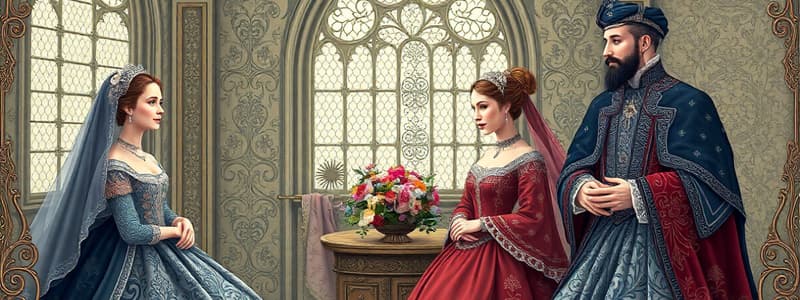Podcast
Questions and Answers
What was a significant factor in the marriage decisions of poorer families?
What was a significant factor in the marriage decisions of poorer families?
- Political alliances
- Desire for emotional connections
- Influence of noble families
- Economic survival and nearby resources (correct)
What does the text indicate about the concept of love in marriage during this period?
What does the text indicate about the concept of love in marriage during this period?
- Love was openly expressed in all marriages.
- Love was primarily reserved for God or neighbors. (correct)
- Love had no significance in marriages of the rich.
- Love was often prioritized over economic concerns.
How did rich families typically handle marriage arrangements?
How did rich families typically handle marriage arrangements?
- With little consideration for political connections
- Through spontaneous romantic decisions
- Through elaborate and strategic schemes (correct)
- Based on the families' individual preferences
What role did children of poor families typically play in their households?
What role did children of poor families typically play in their households?
What is a recurring theme in the structure of European families throughout history?
What is a recurring theme in the structure of European families throughout history?
What was one of the risks associated with marrying for love in poorer communities?
What was one of the risks associated with marrying for love in poorer communities?
How were family relations viewed in the context of marriage during this period?
How were family relations viewed in the context of marriage during this period?
What was typically regarded as highly suspicious in marriage among poorer families?
What was typically regarded as highly suspicious in marriage among poorer families?
Flashcards are hidden until you start studying
Study Notes
Inequality in European Families
- Extreme disparity exists between rich and poor families, creating distinct family worlds.
- Wealthy families engaged in elaborate marriage arrangements, involving land, armies, and political power.
- Poor families focused on economic survival, selecting spouses based on proximity to farmland and resources.
Function of Marriage
- Marriage served as a political and economic institution for both rich and poor families.
- For the wealthy, marriage maintained lineage and established alliances between powerful families.
- Among the poor, marriage facilitated labor cooperation, essential for effective agricultural work.
Economic Realities of Children
- Children in poor families contributed as laborers in a family economy, facing harsh living conditions.
- Their lives were characterized by hard work and limited prospects, contrasting with notions of childhood innocence.
Attitudes Toward Love
- Marrying for love was viewed as risky and socially disruptive, mostly avoided by families.
- Passionate feelings towards spouses were often seen as suspect, raising concerns over social stability.
- The concept of love before the 1600s mainly described feelings for God or neighbors rather than familial love.
Role of Patriarchy
- Patriarchy dominated European family structures, granting men control over property and authority within the family.
- While patriarchal authority varied, it was predominantly recognized both formally and informally.
- Matriarchal societies are rare in history, with men often holding more power even in matrilineal cultures.
Legacy of European Family Systems
- The dynamics of male power in society and within families are interconnected and mutually reinforcing.
- These historical family structures and gender dynamics influenced family life in American colonies.
Studying That Suits You
Use AI to generate personalized quizzes and flashcards to suit your learning preferences.



